- Home
- V. S. Alexander
The Irishman's Daughter Page 4
The Irishman's Daughter Read online
Page 4
Irritation flashed in Lucinda’s eyes, but the look was momentary. “It’s not something I planned to do, but if it’s necessary, Father. . . if I can command the attention of three young English boys, I can certainly manage subservient tenants.”
Briana wondered if her sister knew that the thirty families who now lived on the lands surrounding Lear House had continued to propagate through division and subdivision of the acreage, until even her father wasn’t certain how many people now lived on the estate. A census would have to be taken to ascertain the true figure.
“England has treated you well, Lucinda,” Rory said as he eyed her from head to toe. He bowed slightly to Brian. “I’ll come by at five tomorrow morning with the horses after I’ve had a chance to eat and to feed my pig.”
Lucinda sniggered. “Pearls before swine. I’m so glad to be home.”
“And we’re happy too,” her father said flatly. He looked up at Rory. “If I were you, I’d get rid of that ribbon before we travel to Westport.”
Rory flushed and grappled with the green ribbon that hung from a buttonhole in his jacket. “Yes, sir. I forgot it was there.” He finally captured it and shoved it in his pocket.
“That’s a good man,” Brian said.
Rory backed out of the drawing room. “I’ll let myself out. I wish you all a good evening.”
“What was this business about the ribbon?” Lucinda asked after the door closed. She shot Brian a quizzical look. “I hope that doesn’t mean he—”
“You must be famished,” Briana said to Lucinda, cutting off her question. “I’m hungry too. Since the stove is fired up, I’ll cook here.”
“I’ll explain later,” Brian said. “I’ve been meaning to talk to Rory. Lucinda, please help your sister.”
Lucinda stood up. “Not in this dress, I won’t. I’ll change. After we eat, I’m off to bed.” She walked to the hall and opened her trunk. Soon Lucinda was headed upstairs with a dress draped over her arms, her white-buttoned shoes clicking against the wood.
Brian’s back bent into a bow. He covered his face with his hands and massaged his graying temples.
Briana knew that he was distressed about the future of Lear House, and at the green ribbon threaded through Rory’s jacket. It was a symbol that Rory had only recently begun to wear, and it made Briana uneasy as well. She had heard of the Ribbonmen in songs and tales passed on through families. Although the group’s aim was noble, as described by Rory—a secret society of Catholics who stood up for tenants’ rights—clashes had erupted for many years with Protestants.
She looked at her father still bent in his chair. What saddened her most were the tales and songs that told of the Ribbonmen’s history—of bloody battles fought on Irish soil between Irishmen. She wanted no part of death and destruction, and she hoped she could talk Rory out of his allegiance to the group. But that might be like fighting the waves that crashed upon the Stags of Broadhaven. One might as well try to tame the wild ocean.
She closed her eyes and tried to think of thoughts less disturbing than religious turmoil and hunger. Was Rory saying that everyone was going to starve, the Walshes included, if they couldn’t get food in Westport?
She patted her father’s back. He looked up, his lips stretched in a thin smile. Their world had become much more fragile.
CHAPTER 3
True to his word, Rory arrived early the next morning with his supplies, ready for the journey. The sunless sky, still harboring its misty stars, hung over Briana as she stood in the chilly wind. She held a full pouch containing soda bread, potato scones, and cheese. Her father, puffing on his pipe, stood next to her, holding additional bags of food and water. The burning tobacco glowed red. Ashes sputtered into the air in orange arcs and fell in black specks on the dew-slickened steps.
Once they had gathered, they walked to the stable on the northeast side of the house and loaded their supplies on the three ponies selected to make the trip. Her father called them “bog trotters” because they were good horses to ride on the open heath. The animals instinctively knew how to avoid the brambles, the furze, and the watery stretches of bog by stepping from tussock to tussock, the high mounds of dry grass that dotted the heath. Briana had been around horses since childhood and had learned to ride at an early age. At one time, Sir Thomas had been proud to call Lear House home to more than fifteen of the animals. But over the years, as costs increased and revenues decreased, a good number of the horses had been sold or traded. Only five remained—the three trotters and two working animals.
They struck off down the lane that led to the village road. Briana wrapped her shawl around her head and shoulders and eased into the rhythm of the horse. The tenants’ homes slipped past them. Candlelight flickered in the few cabins that had windows. White smoke from the turf fires whirled from the openings cut into the structures.
A long two-day journey to Westport lay ahead. It would have been easier for them to travel to Belmullet and then take a ship to their destination, but Rory said he knew of no ships in the harbor since the one carrying Lucinda had departed.
Briana looked back as Lear House, dark and imposing, fell away. The quiet cottage where Lucinda still slept, after a promise from her father not to wake her, faded from view as well. She and her father had eaten a breakfast of oats and buttermilk, taken from the manor stores. Supplies, once abundant, were running low. Many grains, even though stored in jars with lids, were under attack from insects and mice as if the lowly creatures hadn’t enough to eat as well. Margaret would never have allowed such unpleasant incidents to occur.
“It’s too bad we couldn’t take Ariel and a wagon,” Rory shouted back at her. Ariel was Jarlath’s donkey, but hauling three people over the rough roads would be arduous for the animal.
They would start on the high bog lands near Carrowteige and descend to a river crossing. The road would take them past the east side of Carrowmore Lake, crossing the bridge at Bangor, past Ballycroy, skirting the valley below the green and rusty hues of the Nephin Beg Mountains. The final miles would lead them through the expansive hills that bordered the coastal towns of Mulranny and Newport before they finally arrived in Westport.
After forty-five minutes on the horses, a bruised purple light scattered across the eastern horizon. Rory led the way, Briana in the middle, and her father bringing up the rear. The heath dropped away into a black cut in the land. Rory slowed his pony and looked for the shallow point of the river that allowed the crossing. He shielded his eyes as the sun rose, its rays infusing the sky with yellow and pink.
Majestic swathes of blue encircled the coursing, patchy clouds. Briana was lost in the splendor of the bracing air, the clean scent of the water, when something startled her horse. The animal pitched sideways, nearly knocking her from her saddle.
A man’s bony hand, all withered skin and sinew, knuckles protruding, grasped for her leg. He shouted at her, and at first she couldn’t understand what he was saying. Rory and her father circled around as the horses trotted to a stop.
“Do you have food?” He repeated the question several times, his voice piteous, raspy, in its pleading.
Rory gave a knowing look to Briana, a signal to keep her mouth shut. “We have no food. We’re on our way to Westport to see what might be done for our own families.”
The bearded man’s jacket was coated with mud, his breeches shredded near the ankles, his naked feet slopped with muck. His clothing shivered on him like rags in the wind. If a man of Rory’s strength squeezed him too hard, he might break in half.
“Please, please . . . have mercy,” the man begged.
Briana dismounted from her pony.
“Daughter!” Brian rose on his horse.
The man’s mouth wrenched into a frown.
“My wife, my children,” he pleaded. “We have nothing to eat.”
When she peered deep into the brush that lined the swift water, the family appeared. There, as if animals hidden by the branches, a woman and two children crouched
in a hole by the bank. The thatched boughs that formed a crude roof over their heads shadowed their faces. She walked toward them as six piteous eyes stared at her. Their hollow gazes seemed an exact measurement of their despondency, their bodies devoid of joy. Anguish stung her heart. Never had she seen such suffering.
“What can we do?” she called to Rory. Her gaze shifted to the provisions strapped to the side of the horse by straw ropes.
His eyes followed hers. “At the moment, nothing,” he said with little emotion. He jumped from his horse and walked toward the sceilp. “Where are you from?”
The man tottered on his feet. “Clanwilliam.”
“Evicted?” Rory asked.
The man nodded.
“How long has it been since you or your family have eaten?” Briana asked.
“My wife and children last ate two days ago. I’ve had nothing going on four.”
“My God,” Briana said to Rory. “We must give them food.”
He took her arm, turned her away from the man, and walked a few yards along the bank. “I understand your sympathy and I feel bad as well, but think of what you’re offering. If we help every beggar, soon we’ll have nothing of our own.”
“Beggar?” She looked at him with fresh eyes, questioning his charity to his fellow men. This was a part of him she’d never seen. She stepped away, quelling her rising anger. “This family is from Mayo. They deserve better. We would do it for anyone who lived on the estate.”
Brian walked up from behind and heard Briana’s words. “Be cautious, daughter. These are bad times.”
She understood what Rory and her father were saying, but she couldn’t ignore the pathetic state of the family who stood before them. “We can go back—get something. . . .”
“No,” her father replied in a soft but firm tone. “We’re more than an hour from Lear House. We might as well forget getting to Westport in time to meet the ship if we turn back.”
“Anything . . . anything you can give us,” the man shouted in his hoarse voice. “We would be in your debt.” He was like a sad apparition, watching them with sunken eyes from his spot near the river.
“Yes, I can give you something.” She went to her pony and lifted the cover of the pouch. Rory sighed behind her as she turned to see her father’s frown. She pulled out two scones, two slices of soda bread, and a small hunk of cheese.
She was about to give the food to the man when Rory stopped her. “No!”
“Why not?” she asked, irritated by his command.
“Let me.” He took the food and handed it to the starving man.
“Thank you,” the man said. Tears welled in his eyes. He took the bundle, staggered toward his starving family, and collapsed in the sceilp. Briana saw the man’s wife question him as he tore the food into small bits. The woman’s voice was so weak Briana could not hear her, but she appeared defeated, on the verge of fainting.
Rory scrubbed his hands in the river before mounting his horse. His eyes narrowed as he approached Briana. “That was a mistake.”
He helped her back on the pony. “It was no mistake. It was the right thing to do. We can’t let them starve.”
“What if we have nothing to give?” Rory asked. “What will we do then?”
One of the man’s small sons had crawled from the hole and, with his dirty thumb stuck in his mouth, stood on the side of the river staring at them. “Look at him, will you,” Briana said. She flushed with anger at the sight of the child, his face and neck sunken, his skin flattened against his skull like a wizened old man. The boy shifted in the sun and she noticed something that horrified her. The top of his head was nearly bald, but a coating of fine hair covered his face, as if he were changing into an animal, a wolf of sorts. She looked at Rory for an explanation. “Why did you stop me from handing over the food?”
Rory turned and waved to the boy, then mounted his pony. Before he shook the reins he said to Briana, “Look at that child. I’m sure the hair on his face comes from starvation. We’ll see more like him now that food is scarce.” He paused. “Something was crawling over that man’s skin. I couldn’t let you touch him.” He urged his horse onward. “You don’t know how desperate I feel. I want to do something . . . anything that will make things better. But I won’t sacrifice my family for others.”
Her father gave Rory an understanding look as the horses trotted off together.
A flush rose on Rory’s neck. “I’m sorry. I’ve spoken out of place. I’m not part of your family . . . but that man, and the others like him, are why I wear the green ribbon. We’ll stop on the way back if we have more to give.”
Rory’s voice was filled with an urgency that Briana had never heard, and she realized he had protected her and her father despite her irritation with him. Many years ago in Westport, she had seen dragoons marching near the quays. The commanding officer had sounded the same. The thought of Rory turning into such a man dismayed her. However, she had seen only his reticence at first and mistaken it for a hard heart. She was wrong.
Her heart sank as she looked back toward the family. After they crossed the river, the sceilp was no longer visible. The family had vanished like sad, thin shadows to be blotted away by clouds. Something plucked at her arm; the wind perhaps. When she turned to look again upon the heath, a sad specter ran behind her, a leering harlequin with a skeletal face dressed in a jester’s garb. He held a potato in both hands. As she watched, the potatoes melted into a mass of black, putrid liquid. She shook the vision from her head and then turned her attention to the road.
* * *
After four more hours of traveling, they stopped at Bangor, a village of stone buildings lining the Owenmore River. Briana, Rory, and Brian ate their food near the cold, blue waters as the horses drank and munched the spring grass. Brian, as a surprise, had procured meat and eggs from a rather dingy public house. Then they traveled another three hours before arriving at their stop for the night, the stone cottage of Frankie and Aideen Kilbane, who lived south of Ballycroy on the strip of heath bordering the western slopes of the Nephin Beg. The Kilbanes earned their living by hosting travelers traversing the boggy road between the southern inlets of Blacksod Bay and the mountains. They tethered their horses to a picket line near a small shed and fed them from their supply of oats. Plenty of fresh water was available for the animals.
That evening, they shared scones and potato bread in addition to a watery carrot soup provided by Aideen. The couple, Briana noticed, looked in good health, as if the blight had not affected them. Frankie played the flute and guitar after dinner while Aideen sang. Frankie told them of the skeletal travelers, the famished animals, they had seen on the road outside their door. They could not help everyone, he said, and often they had to shelter their own livestock in the house to protect them from being stolen.
Soon, Briana nodded off in the warmth of the log fire. The Kilbanes pulled rush mats into the main room for sleeping, while she and her father retired to straw beds in a separate area reserved for travelers. Rory slept near the door, not far from the stone fireplace, with the Kilbanes and their long-haired hound at his side. The dog barked once during the night at something that rustled outside. Rory checked on the horses, and nothing was amiss.
They left early the next morning after a good breakfast and payment to their hosts.
Warm sun and the pony’s rocking motion nearly lulled Briana to sleep as they traversed the rolling hills to Westport. The land rose and fell across cultivated farms, until the road led them high over the wind-swept bay at Mulranny. After brief stops and more hours of hills, the cloudy peak of Croagh Patrick, where the Saint had fasted for forty days fourteen hundred years earlier, appeared as they rounded a curve. The base of the purple and green mountain, the Reek, shimmered in the late morning sun. Her father had told her the Saint’s story years ago upon her first visit to Westport.
Westport, with its towering monument in the center of the village and its graceful stone, arched bridges, was only a few minutes a
way. They crossed the brown, iron-laced waters of the Carrowbeg River and ascended the top of a hill to the south of the village center. The harbor, shining and blue with white-capped waves, lay to the west. Near the horizon, far past the end of the quay, the spars of two tall ships pierced the air like black arrows. Another ship was harbored as well: a sleek steamer, a vessel Briana had never seen before, outfitted for sail or engine power.
“The steamer’s in,” her father said. “I hope we’re not too late.”
“Never too late,” Rory said. “If they’re not onboard they’ll be in the public house.”
As they watched, one of the tall ships set off in Clew Bay, veering toward the open Atlantic. Its lower sails caught the northwest wind, and soon it was cutting across the hard, blue waves and out to sea. Briana saw several sailors, as tiny as ants, climbing hand over hand up the masts. What must it be like to be on one of those ships or on the exciting new ship called a “steamer”? Lucinda had said little about her voyage from Liverpool to Belmullet except to complain about her cramped cabin and her bouts of seasickness.
Lucinda loved her travels; Briana was happy at home. The familiar cliffs at Carrowteige, the bracing freshness of the air, the feel of the boggy earth underneath her bare feet, were all she needed. The ever-shifting Atlantic provided the only change of scenery she required. Lear House, despite its troubles, was home—worth keeping and fighting for. She imagined herself as an old woman sitting by the cottage fire with Lear House standing solidly by. Would her life be different from what she pictured it to be?
After traveling west, past a large stone house—a mansion of greater size than Lear House—they arrived at the quay and its row of multistoried buildings. Men hustled through the port to the doors of various merchants while donkeys pulled wagons loaded with boxes and wooden chests. Several single-mast sailboats creaked against the stone quay. From the signs, she could tell most of the shops were related to the sea: a sail maker, a mast carver, merchants specializing in the shipment of goods. An apothecary business that claimed to sell food as well as medicine was shuttered. A chain hung heavy and morose across the door of a grain merchant.

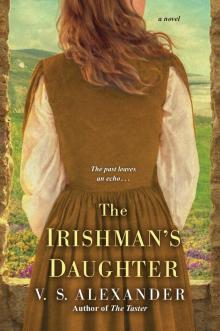 The Irishman's Daughter
The Irishman's Daughter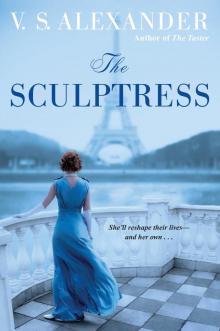 The Sculptress
The Sculptress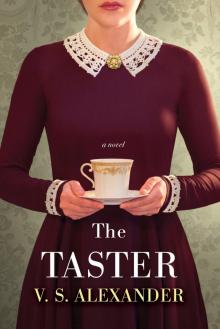 The Taster
The Taster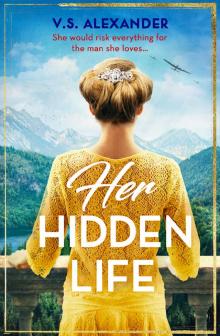 Her Hidden Life
Her Hidden Life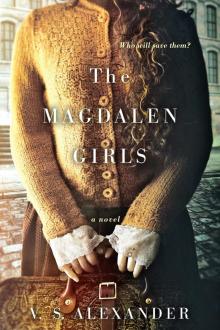 The Magdalen Girls
The Magdalen Girls